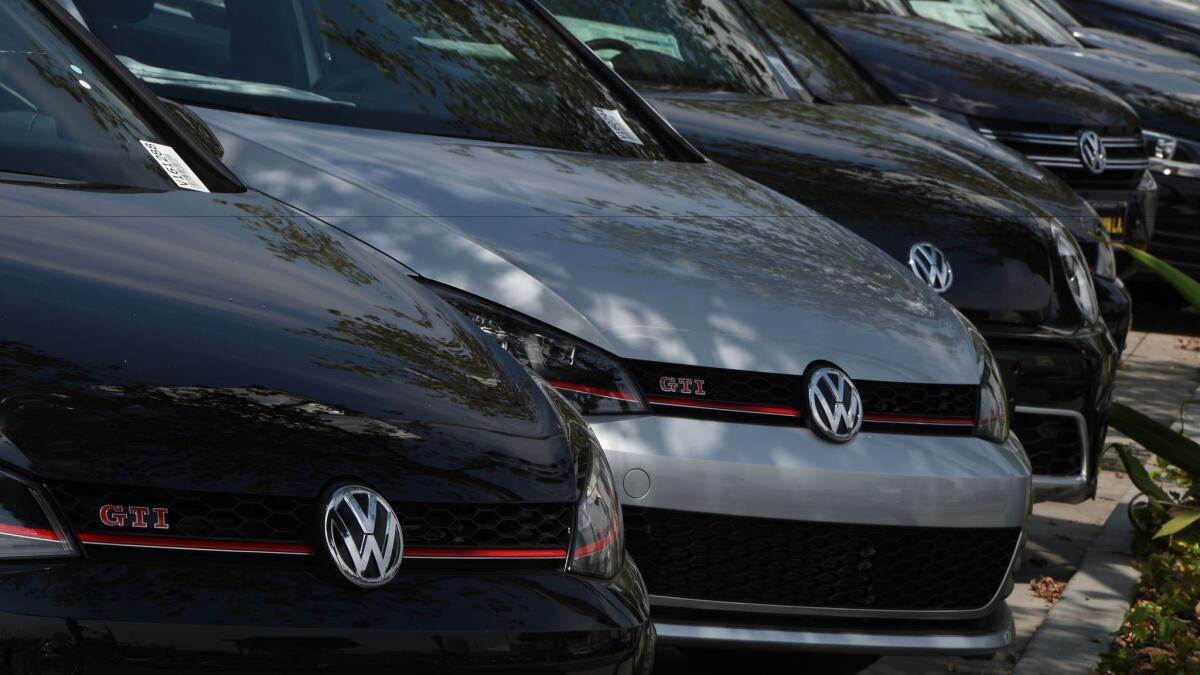What emissions scandal? VW may have just become the world’s top-selling automaker

- Share via
Volkswagen spent 2016 battling a huge scandal over cars it rigged to cheat on emissions tests.
But now it stands a decent chance to pass Toyota for the title of world’s biggest carmaker for the year.
Booming business in China helped Volkswagen sales climb to 10.31 million vehicles last year across all its brands, which include Audi, Porsche and Skoda, the company said Tuesday.
That was up 3.8% from 2015, when Volkswagen came in second to Toyota. And a strong finish to the year in December — 11.8% better than the same month the year before — improves the company’s chances of moving from No. 2 to No. 1 in global sales.
That Volkswagen is even in the running for top spot seems remarkable considering how terrible the year was on the legal and image front.
The company, based in Wolfsburg, Germany, agreed to a $15-billion settlement for claims from U.S. environmental authorities and owners of 500,000 cars. It faces investor lawsuits and criminal investigations in Germany and the U.S., where a heavy criminal fine is likely. Volkswagen has admitted to equipping diesel cars with software that turned emission controls on when the vehicle was being tested and off during daily driving.
The scandal news kept coming this week as Oliver Schmidt, Volkswagen’s former head of U.S. environmental compliance, was arrested in Florida and appeared in a Detroit court in prison garb and shackles. Engineer James Liang pleaded guilty last year and offered to assist federal law enforcement in their investigation.
Despite all that, huge demand in China may be enough to push Volkswagen past Toyota, its Japanese rival, and Detroit-based General Motors. Neither rival has reported 2016 sales yet. For 2015, Toyota Motor Co. came in first with 10.15 million vehicles sold, Volkswagen was second with 9.93 million and GM was third with 9.8 million.
Volkswagen’s improved sales show how crucial China has become for Germany’s carmakers, including BMW and Daimler. Of the three, Volkswagen is the most dependent on China. It sold 3.98 million cars there last year, more than a third of its total unit sales.
Volkswagen was barely behind Toyota after 11 months of 2016, but China in particular fueled the strong December. U.S. sales, which are much smaller, were down 2.6% for the year.
To add a layer of irony, overtaking Toyota would come only after Volkswagen abandoned its goal of achieving global supremacy in raw sales numbers.
Dethroning Toyota was part of the company’s Strategy 2018 pushed by then-Chief Executive Martin Winterkorn, who lost his job because of the scandal. But the new CEO, Matthias Mueller, has dropped that emphasis on unit sales in the latest strategy, amid concerns it fostered a management culture that could have helped create the emissions scandal. The new plan focuses more profitability and a greater emphasis on electric vehicles and on digital services such as car sharing and ride hailing. Toyota also downplays the sales race.
Other factors helping Volkswagen sales: The company’s other brands, particularly Audi, Porsche and Skoda, helped make up for any weakness at the namesake brand.
And Volkswagen didn’t sell many cars in the first place in the U.S., where the scandal first broke in September 2015.
“China is the big equalizer,” Ferdinand Dudenhoeffer, director of the Center for Automotive Research at the University of Duisburg-Essen, said in an email. “Diesel plays no role there, so your reputation can’t suffer. China today is the center of the automotive world, for Volkswagen as well.
“And when you look more closely at the numbers,” he said, “Volkswagen didn’t lose so much in the end in Europe because Audi and Skoda were able to buck the trend a little.”
After a robust last quarter of the year in China, where Volkswagen is stronger than Toyota, “Volkswagen would have to have the edge,” Dudenhoeffer said.
For decades, Volkswagen has grown its business in China steadily. High-end offerings such as Porsche, Lamborghini and Bentley vehicles are imported, but the company has a large presence on the ground making cars specifically for the mass market there with Chinese partners. Its joint-venture agreements with its local partners, SAIC Volkswagen and FAW-Volkswagen, date to 1984 and 1990, respectively.
China’s car market has grown for 26 straight years, and did so again in 2016. Sales were boosted by a tax cut on cars with smaller engines; some people may have hurried to make purchases because it isn’t clear whether the tax break will be extended next year.
Volkswagen still faces serious challenges. The Volkswagen brand has shown skimpy profits because of chronically high costs, and more than half of the wider group’s profits come from the luxury Audi and Porsche units. The Volkswagen division is shedding 23,000 jobs to save $4 billion a year from 2020, but it still has a long way to go.
The top three carmakers make roughly the same number of vehicles per year, but Toyota needs 349,000 workers and GM only 202,000 while Volkswagen employs 624,000. The company remains a niche producer in the large U.S. market, and the damage to its image from the scandal won’t help that. Investigations and lawsuits remain open.
And along with all the carmakers, it faces possible disruptive competition from tech companies that may muscle into their business through new ways of getting from one place to another, including ride-hailing apps, car sharing and autonomous vehicles.
But it’s a crown Volkswagen wouldn’t refuse.
ALSO
Snapchat in 2017: 7 predictions about what’s next
Trump’s tweets are a new challenge for automakers
Meet the Hollywood producer at the center of a scandal shaking the Israeli government






